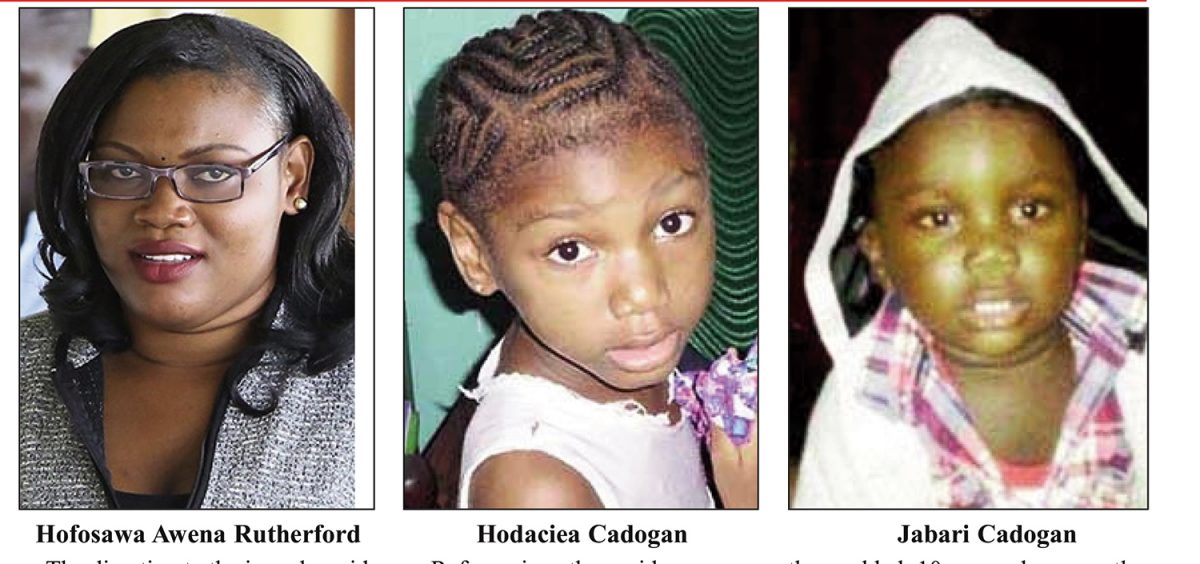Having heard the appeal filed by Hofosawa Awena Rutherford to her conviction and sentence for poisoning her children back in 2014, the Court of Appeal will next move to deliver its judgment.
Following the hearing on Monday, acting Chancellor Yonette Cummings-Edwards announced that the court will disseminate notices to the attorneys, informing when it will rule.
Rutherford through her attorney Dexter Smartt, has argued that the judge who conducted her trial, failed to assess the voluntariness of statements the police said she made, incriminating herself.
In challenging her conviction, Rutherford (the Appellant), also contends that the 98-year jail sentence imposed upon her for killing her four-year-old daughter Hodaciea and one-year-old son Jabari Jr, was excessive.
Smartt in his address to the court submitted that trial judge Navindra Singh erred by not enquiring into whether statements Rutherford was alleged to have given to the police, which seemingly incriminated her; had been given freely and voluntarily.
He said that while the statements had been admitted into evidence and placed before the jury for consideration, the judge committed a grave error by not first assessing its voluntariness.
In response to an inquiry from Chancellor Cummings-Edwards, Smartt confirmed that the lawyer who represented Rutherford at the trial, never challenged the statements, nor did Rutherford herself ever deny having made the particular statements.
Notwithstanding this, however, the lawyer referenced case law authority and sought to make the point that the trial judge ought to have assessed and ruled on the voluntariness of the statements allegedly given.
State counsel Teshana James-Lake for the prosecution conceded the point that the trial judge should have made a ruling on the voluntariness.
She, however, said that when his summation of the case to the jury is carefully examined, especially the direction given to the jury on how to treat with the caution statement given by the Appellant, that process would have taken account of the circumstances under which the statements would have been given/made.
Against this background she said that the jury would have been made fully aware of the fact that it needed to be satisfied, that Rutherford did or did not make the statements, before they could attach any weight or act on it.
The direction to the jury she said, was sound, even in the absence of a ruling from the trial judge on the issue of voluntariness. She was keen in reminding too, that Rutherford never herself ever denied giving the statements to police.
James-Lake said that in all the circumstances, the State is of the view that the caution statements were properly treated with by the trial judge.
On the issue of sentencing, Smartt contends that it should have been imposed concurrently and not consecutively. He used a legal precedent to make the point that while there were two deaths, they flowed from the same set of circumstances.
For a concurrent sentence, Smartt clarified that he would opt for the lower sentence imposed for the deaths. On the first count, Rutherford was sentenced to 45 years and on the second count to 53 years.
James-Lake said that while the prosecution has no difficulty with 45 years being imposed, it was the totality principle which assessed the overall criminality of the matter that would have led to the sentences being made to be served consecutively.
She said that those factors outlined by the trial judge, added to the fact that he found no mitigating circumstances, were all apart of why the sentences were ordered to be served consecutively.
High Court sentence
At the sentencing hearing, Justice Singh said he could not understand why the woman was not indicted for murder, while noting that he found the killings to have been premeditated.
“Everything points to murder,” the judge had opined.
Rutherford was indicted on two counts of the lesser charge of manslaughter. A jury on March 15th, 2018 found her unanimously guilty on both.
Referencing the evidence presented at trial, Justice Singh said he could not fathom how Rutherford could possibly have mistaken the rat poison that she administered to her children for anything else.
Rutherford’s claim had been that as far as she knew she had bought and given to them “cold tablets.”
The judge remarked that the poison, in the form of carbon tablets, carries a pungent odour, which would have become evident from the moment its packaging was opened.
He said the fumigation scent would not be missed as such tablets do just that, “fumigate.”
Emphasising that he had found evidence of premeditation, the judge commenced sentencing on each count at a base of 30 years. He then added 10 years because the victims were children, five years because they were the convict’s children and another five years for the use of poison.
Thereafter, he added an additional 10 years for what he found was a premeditated act.
Therefrom, he subtracted eight years from the first count for the probation report and another seven years from both sentences for Rutherford’s expression of remorse.
On the first count, the woman was sentenced to 45 years and on the second count to 53 years.
The judge ordered that both sentences be served consecutively, with remission of some four years for time Rutherford would have spent awaiting trial on each count.






